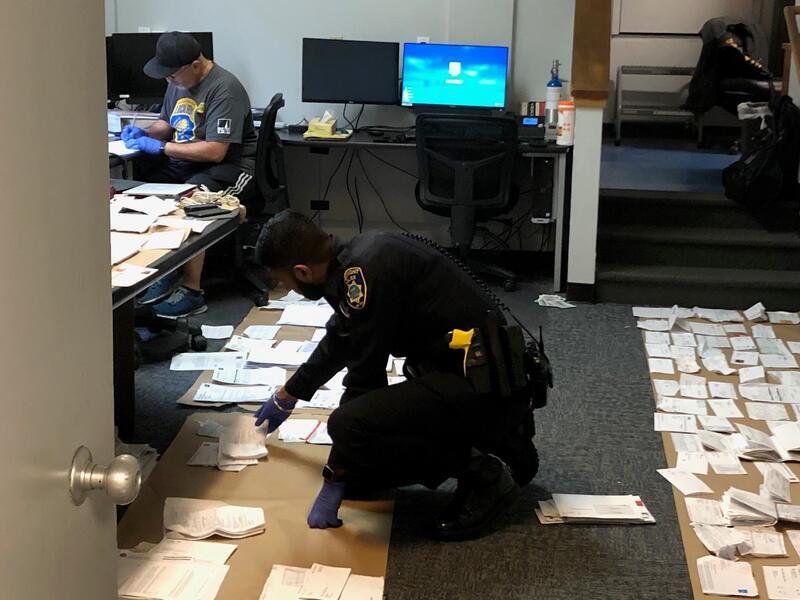Many of the city’s basic crime statistics were up in 2020 from the year before, and Piedmont’s police chief said that COVID-19 likely is a major factor.
“Clearly, COVID is a substantial component of this,” Police Chief Jeremy Bowers told the Piedmont City Council Monday night during his 2020 year-end crime stats report. “Folks are more desperate during these times, and some kinds of support are not readily available. It’s not hard to understand how that general deterrent effect has waned.”
Bowers told the council that overall reportable offenses in Piedmont were up in 2020 — 370 reportable cases in 2020, from 244 cases in 2019. Bowers said upticks in larceny thefts (increased thefts of catalytic converters from vehicles were a big piece of this), motor vehicle thefts, and burglaries drove the overall increase. The “larceny theft” category covers vehicle break-ins, bike thefts from open areas, catalytic converter thefts, identity thefts, and similar crimes. Thefts categorized as larceny increased from 162 reported offenses in 2019 to 236 in 2020.
The theft of catalytic converters, which contain precious metals like rhodium, platinum, and palladium that have value with scrap dealers, has been a problem for law enforcement regionally and beyond.
Burglary, generally defined as breaking into a building or vehicle to take or damage property, with human victims not directly involved, increased from 47 reported incidents in 2019 to 60 reported incidents in 2020.
The number of Part One offenses as reported to and compiled by the FBI directed against people — homicide, rape, robbery, assault — declined slightly in 2020, from 15 reports in 2019 to 13 last year. There were six reported robberies in Piedmont in 2020, all of them involving suspects approaching people on the street, Bowers said. There were no home-invasion-style robberies in 2020.
Bowers praised the city’s growing network of automated license plate reader (ALPR) cameras in helping identify suspects in three of the six robberies (who were then arrested). Also related directly to the ALPR cameras, Piedmont police officers made 17 arrests in 2020 and recovered 34 stolen vehicles — up slightly from 14 arrests and 33 vehicle recoveries the previous year.
The increase in Part One crimes came despite a significantly lower number of overall calls for service — from 14,312 in 2019 to 9,844 in 2020.
Traffic collisions were down sharply in 2020, with 50 accidents reported in 2020. That compares to 73 reported in 2019, Bowers said. That drop, Bowers said, is probably a silver lining of the pandemic, as fewer Piedmonters were driving to and from work, and more of them have been working from home.
Piedmont police concentrate their traffic patrols around the city’s schools, as well as on the city’s more highly traveled thoroughfares, including Oakland, Highland, Wildwood, Grand, Moraga, and Linda Avenues, Estates Drive and Hampton Road.
Drivers either driving too fast, or not paying enough attention to the road, continue to be the main causes of local traffic collisions, Bowers said.
Bowers also said that police officers have reduced “non-essential public contacts” because of COVID-19, for the protection of both his officers and of the general public. He stressed, however, that COVID is not affecting necessary police responses.
Piedmont police, Bowers said, have also moved this past year to further limit “use of force” by its officers, including the June suspension of the use of the “carotid control hold,” in which an officer wraps an arm around a suspect’s neck to subdue him or her by cutting off blood to the brain. Bowers said his force also has bolstered its de-escalation training, spurred by a 2019 law that redefines the circumstances under which lethal force by a peace officer is considered justifiable. Alternatives, including less-lethal force and de-escalation techniques, are taking on more prominence, he said
Council members on Monday night said they are glad Bowers has been having these policy discussions, including those involving how implicit bias affects policing, and how such biases must be minimized.
“I’m always second-guessing even my own implicit biases that I may have,” Mayor Teddy Gray King said.
Another change in 2020 was a change in policy for investigating officer-involved shootings or in-custody deaths in Piedmont. Whereas police departments typically do their own internal investigations, parallel to a District Attorney’s investigation of any officer-involved shooting, such investigations pose problems for departments as small as Piedmont’s. Formal discussions started in May for the Alameda County Sheriff’s Office to do any such investigation involving Piedmont officers; Bowers said Piedmont is the first Alameda County city to make this change, and may not be the last.
Comparing the numbers for the last three years:
- 2018 Robberies – 10
- 2019 Robberies – 5
- 2020 Robberies – 6
- 2018 Burglaries – 47
- 2019 Burglaries – 47
- 2020 Burglaries – 61
- 2018 Larceny/Theft – 123
- 2019 Larceny/Theft – 162
- 2020 Larceny/Theft – 236
- 2018 Motor Vehicle Theft –25
- 2019 Motor Vehicle Theft –19
- 2020 Motor Vehicle Theft –60
Contact Sam Richards at sam.richards4344@gmail.com

The crime statistics in the staff report show an increase in crime but a drop in ALPR hits (9374 in 2019 to 9081 in 2020). That’s a small drop but given the large increase in crime one would think ALPR hits would go up – more criminals entering town in more stolen vehicles = more hits. Are criminals finding ways to go undetected by APLR? There are successes with APLR but over 3 years crime has risen as the program has been expanded.